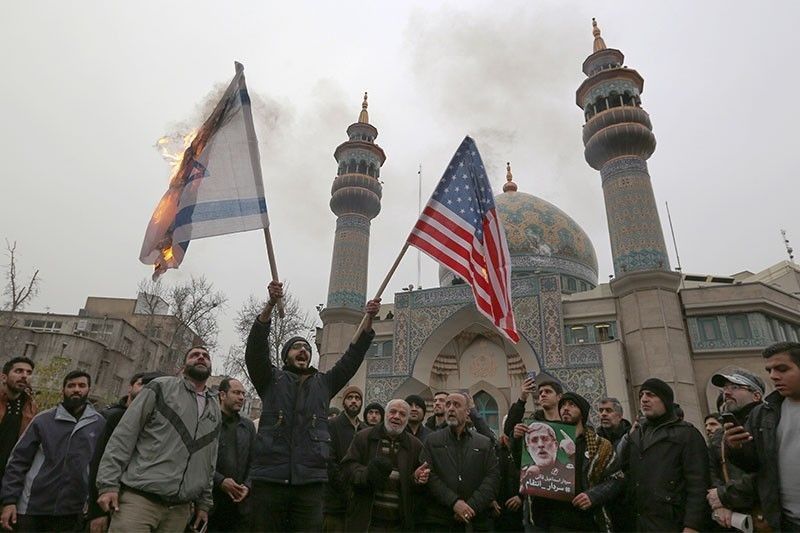A major war in the Middle East can seriously impact us


Once again, the Middle East is in very dangerous turmoil. The conflict between the United States and Iran could escalate into a shooting war.
A US drone directed-attack that killed a ranking Iranian government official, General Qasem Soleimani, who was considered a military leader second to none in that country, has created this new crisis.
Geopolitical framework of threat. The threat of war brings focus to the world’s energy supplies originating from the Middle East. Disruption of oil-and-gas supplies through destruction of fields or disruption of the shipping lanes could bring about high prices.
In fact, US and Brent futures have risen. As of yesterday, Brent crude has nearly reached $70 per barrel, while US oil was along $64 plus per barrel.
The price of gold – a signal on the anxieties along financial and currency markets – has reached six-year highs for the first time. When such happen, world exchange rates are also volatile and price inflation predictably around-the-corner.
Of course, the stock markets have also been jarred and taken notice. Volatility is a mark for many of these varied economic markets.
The next phase of volatility depends on what comes next: the Iranian and the American response to that response. Iran says it does not want to provoke a war, but it is calculating a harsh and equal response. What “equal” means depends on perception of the country that has been hit by the response. Escalation and war could happen.
Prospective impact on the Philippines. To a large extent, we are still highly dependent on this orderly flow of trade in energy. This is because, despite our much more diversified energy dependence structure, oil and gas imports are still significant. Moreover, our domestic supply of gas fields from Malampaya is on the wane.
Thus, price spikes due to geopolitical shocks could be expected.
This happens despite the weakening presence of Middle East energy supplies on current world supplies. Major discoveries outside of the Middle East have been large. The fracking revolution in shale oil processing has made the United States almost self-sufficient in energy.
Yet, there is still a strong dependence on energy supply among oil-importing nations, the Philippines included.
Is it different this time? Judging geopolitical events explode into big, uncontrollable events is not an easy thing to do. The world could stumble into war or not at all when human calculations and error or bravado are involved.
In mid-September last year, the energy refineries of Saudi Arabia were hit by drone missiles believed to have been orchestrated by Iran although they were supposed to be coming from the rebels in Yemen.
That was supposed to be a game-changing moment in the region, given the bellicose threats from all sides before the strikes. After the missile strikes had come to pass, the spike in oil prices rose quickly, and the future was on hold.
But both the US and Saudi Arabia did not rattle and behave like paper tigers. The US and Saudi Arabia decided not to retaliate against Iran probably on the calculation that further conflagration was not in their national interest.
This time around, the US action was direct, confrontational, and almost massive to the Iranian leadership even as the US embassy in Iraq was being threatened by violence from crowds. Perhaps, other factors besides the usual ones were at play, especially domestic factors in the US. The Trump presidency is facing impeachment.
A disturbing notion is this: Could it have been related to the impeachment issue against the US president? As the crisis of potential war had loomed over the horizon, the main topic of discussion in the US has shifted toward the dangers of war.
Philippine second order impact. The economic impact of a potential shooting war that restricts the supply of Middle Eastern oil and gas supplies is not only on the price and reliability of supply of such raw materials.
In a worst case scenario – a war that engulfs a wider region of the Middle East beyond the protagonists – Iran, Iraq, and possibly other countries – there is likely to be a heavy impact on the Philippines.
The country’s balance of payments could be hit hard by a decline of exports, a rising import bill for energy, as well as a decline in remittances.
Then, there is the additional cost to the government’s expenditure that are not anticipated. The repatriation of Filipino workers abroad and their associated costs would be added. Displacements of new labor thus repatriated could have an impact on the domestic labor market.
Hence, the Philippine OFW story could be impacted severely. The disruption of employment opportunities in the Middle East would produce large ripples depending on their severity. There would be consequences on the volume of remittances flowing into the country, there will be additional costs on the government to help repatriate Filipinos stranded in the war in the Middle East, and the arrival of unemployed OFWs could cause a competition for jobs at home.
Most of the repatriated workers are skilled. To the extent that they displace workers at home who would otherwise be employed if they remained abroad, there could be an impact on domestic employment volume.
A further impact at home is on the level of output and the net impact on the balance of payments (affected by the labor market disruption).
We surmise that initially, the employment of displaced OFWs at home could lead to lower incomes generated at home compared to their contribution through remittances.
OFWs working abroad work with higher capital-intensive support in production so that they have higher labor productivity than workers at home. That also explains why average wages at home are much lower, because the economy lacks sufficient capital investments.
Hence, their net contribution to growth and to incomes would be lower, even if, in the end, they might contribute toward a higher GDP.
My email is: [email protected]. For archives of previous Crossroads essays, go to: http://www.philstar.com/authors/1336383/gerardo-p-sicat. Visit this site for more information, feedback and commentary: http://econ.upd.edu.ph/gpsicat/
- Latest
- Trending



























